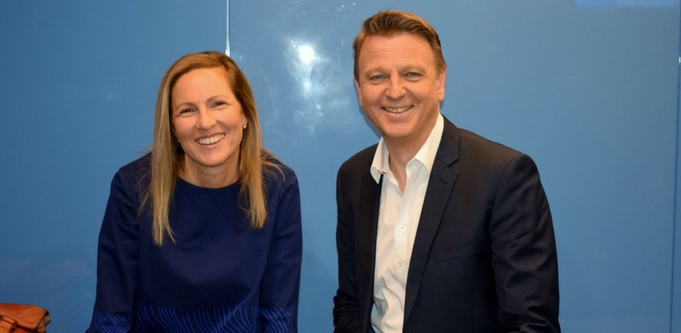
Picaluna co-founder Greg Inglis (right) with celebrant Elizabeth Trevan
The funeral industry has long been dominated by traditional industry players, but Sydney-based startup Picaluna is looking to bring this $1 billion industry into the modern age with its two-sided funeral marketplace.
The Picaluna concept was born when co-founder and managing director Greg Inglis grew frustrated with the overpriced, “cookie-cutter” nature of funerals, after his own mother died and he was “funnelled into a 45-minute service” that he says felt “really rushed” yet still cost more than $10,000.
“We made the most of it but it really didn’t reflect mum’s life or who she was,” he tells StartupSmart.
“Mum and I used to love going to the races — it would have been way more appropriate have her cremated, buy 100 tickets to the Royal Randwick [races], have a laugh, have a cry, tell stories and scatter her ashes. The cookie-cutter approach doesn’t leave you satisfied and doesn’t help the grieving,” he says.
Out of this experience, Inglis founded Picaluna with Chris Hancock, Paul Quinn and Adam Podger in 2014 to give consumers end-to-end control over planning a funeral.
“I sometimes dislike using this term but it’s sort of the ‘uber for funerals’ in it’s model,” says Inglis.
The startup connects users with florists, coffin suppliers, crematoriums and other service providers through a cloud-based platform.
It bypasses funeral directors and charges wholesale prices for coffins and celebrant fees — an area where Inglis says the traditional funeral industry makes most of its money from markups, which can see a 600% markup on coffins alone. Picaluna instead charges a 35% flat rate service fee, and gives 10% of its profits back to the customer’s charity of choice.
The Sydney-based startup facilitated 68 funerals through a pilot program run with the Salvation Army in January 2016, and since ending the trial in September and officially launching last October, has run 92 funerals and added more than 150 celebrants and funeral planners to the platform.
While 100% of the funds from Picaluna’s trial period went to the Salvation Army, Inglis says the pilot was crucial in validating the startup’s offerings. It was through running the pilot that Inglis says the startup received “categorical proof of the concept” that its flat-rate, personalised and altruistic funeral solutions were solving a massive pain point in the market.
“We quickly learnt that really resonated with families — out of a tragic time we were able to help families, be transparent with our pricing model, and have a philanthropic aspect [to the startup],” he says.
Picaluna has previously raised $1.3 million over previous rounds of seed funding from friends, family, and 10 of its celebrants, according to Inglis, and is hoping to close a $3.5 million Series A raise by the end of this month to fund a major re-haul of the platform’s software.
Inglis says the raise is “looking positive” with a few interested investors currently in due diligence. The startup currently operates in the greater Sydney area, but plans to use the Series A funds for expansion into Melbourne and Brisbane in the next 12-18 months.
Don’t be afraid to pivot
While Picaluna launched its pilot testing with the aim of focusing on providing funeral services to aged care facilities, Inglis says the startup quickly pivoted when it found a new source of referrals: the celebrants on its platform.
“Forty percent of the funerals actually came from the celebrants and their networks,” he says.
“We realised that they’re not just our operations team, they are also our salesforce.”
Picaluna’s team of six is now focusing its efforts on “recruiting as many [celebrants] as they can” to spur future growth, and Inglis says there has been a “direct correlation between on-boarding more celebrants and an increase in revenue.”
“Up until December last year we had only done 12 funerals [since launching in October] but we are consistently doing three a week now,” he says.
Follow StartupSmart on Facebook, Twitter, LinkedIn and iTunes.


COMMENTS
SmartCompany is committed to hosting lively discussions. Help us keep the conversation useful, interesting and welcoming. We aim to publish comments quickly in the interest of promoting robust conversation, but we’re a small team and we deploy filters to protect against legal risk. Occasionally your comment may be held up while it is being reviewed, but we’re working as fast as we can to keep the conversation rolling.
The SmartCompany comment section is members-only content. Please subscribe to leave a comment.
The SmartCompany comment section is members-only content. Please login to leave a comment.